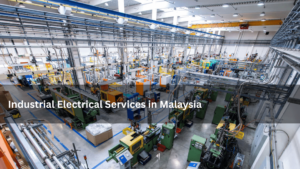Introduction to Industrial Gloves Manufacturing in Malaysia
The industrial gloves manufacturing sector in Malaysia holds a pivotal role in the global supply chain for personal protective equipment (PPE). Over the years, Malaysia has cultivated a robust ecosystem for manufacturing high-quality gloves, making it one of the foremost industrial gloves manufacturers in the world. The journey of glove manufacturing in Malaysia dates back to the 1970s when the first production facilities were established. Since then, the industry has experienced substantial growth propelled by both domestic and international demand.
Malaysia’s strategic location in Southeast Asia and its competitive labor costs have further catalyzed the expansion of this sector. As a result, numerous manufacturers have set up operations in the country, specializing in a wide range of glove types, such as latex, nitrile, and vinyl gloves. These materials are essential in various industries, including healthcare, construction, and food processing, highlighting the versatility and necessity of industrial gloves in contemporary safety protocols.
Furthermore, Malaysia has earned a reputation for adhering to rigorous international safety standards, such as ISO and ASTM certifications. This commitment to quality and safety has bolstered the country’s image as a reliable source of PPE, particularly in the glove manufacturing segment. In recent years, the demand for industrial gloves has surged globally, accentuated by increasing awareness regarding workplace safety and hygiene. To address this increased need, Malaysian manufacturers have continuously innovated and expanded their production capabilities, ensuring that they remain at the forefront of market trends.
In summary, the industrial gloves manufacturing landscape in Malaysia is dynamic and significantly contributes to global PPE supply. The sector’s history, growth trajectory, and adherence to safety standards encapsulate its importance in providing essential protective solutions for various industries.
The Importance of Safety in Industrial Settings and the Role of Industrial Gloves Manufacturers in Malaysia
The significance of personal protective equipment (PPE), particularly industrial gloves, cannot be overstated in various industrial settings. Workers in fields such as manufacturing, construction, and chemical processing encounter an array of hazards that pose considerable risks to their health and safety. These dangers include exposure to harmful substances, injuries from machinery, and environmental factors that can cause severe injuries or even fatal accidents. As such, industrial gloves play a crucial role in mitigating these risks, ensuring that employees are properly safeguarded while performing their tasks.
One of the primary reasons for implementing safety measures is the legal and ethical obligation of employers to provide a safe work environment. Industrial gloves manufactured according to stringent safety standards are designed to offer protection against cuts, abrasions, chemicals, and other hazardous materials. Failure to equip workers with the necessary protective gear can result in significant consequences for both employees and employers, including injury claims, increased insurance premiums, and potential legal liabilities. Hence, investing in high-quality industrial gloves—sourced through reputable industrial gloves manufacturers in Malaysia—can drastically reduce these risks.
Moreover, neglecting safety measures not only impacts workers’ personal well-being but also affects overall productivity and morale in the workplace. When employees feel secure due to the availability of appropriate PPE, including gloves, they are more likely to be productive and engaged in their work. Employers who prioritize safety create a culture of responsibility and care, fostering retention and attracting talent who value safe working conditions. Thus, the role of industrial gloves manufacturers in Malaysia is vital in ensuring that companies can access reliable and effective PPE designed for specific industry needs.
In conclusion, safety in industrial settings is of paramount importance. Ensuring that workers are equipped with high-quality industrial gloves is essential in reducing risks and promoting a safe working environment. The responsibility falls on both employers and manufacturers to collaborate in providing the best PPE, thereby safeguarding the workforce.
Emerging Trends in PPE Manufacturing
As the global landscape of personal protective equipment (PPE) evolves, leading industrial gloves manufacturers in Malaysia are at the forefront of innovative trends that are reshaping the industry. One of the most significant trends is the shift towards eco-friendly materials, reflecting an increasing awareness of environmental sustainability. Manufacturers are now exploring biodegradable substances and recycled materials to produce gloves. This initiative not only minimizes the ecological footprint of production but also aligns with the growing demand from consumers who prioritize sustainability in their purchasing decisions.
In addition to environmentally conscious materials, there has been a notable integration of smart technology in PPE manufacturing. This trend involves the incorporation of sensors and digital interfaces into industrial gloves, enabling real-time data collection and analysis. Such advancements allow manufacturers to enhance safety features and provide users with a more intuitive experience. For instance, smart gloves can modify their grip based on the task at hand or offer immediate feedback on hazardous exposure levels, significantly elevating workplace safety standards.
Design innovations represent another vital trend driving the future of industrial glove manufacturing. Manufacturers are focusing on ergonomic designs that optimize comfort and usability. This entails creating gloves that not only protect but also enhance dexterity and wearability. For example, some manufacturers are now producing gloves that feature textured surfaces for improved grip without compromising tactile sensitivity. These design enhancements not only increase worker efficiency but also reduce fatigue during prolonged use.
The amalgamation of these trends—eco-friendly materials, smart technology integration, and innovative design—demonstrates how industrial gloves manufacturers Malaysia are leading the charge towards a safer, more sustainable, and user-friendly future in PPE. As these trends continue to develop, they are expected to set the standard for the global market and drive further advancements within the industry.
Technological Advancements in Material Science by Industrial Gloves Manufacturers in Malaysia
The evolution of industrial gloves, driven by technological advancements in material science, has significantly influenced the landscape of personal protective equipment (PPE). Industrial gloves manufacturer Malaysia has been at the forefront of implementing these innovations, aiming to enhance the safety and comfort of users across various industries. One key area of development is the use of synthetic materials, which offer superior protection compared to traditional materials. Synthetic options like nitrile and latex not only provide excellent barrier properties against chemicals and abrasives but are also more durable, contributing to a longer lifespan for the gloves.
Furthermore, the emergence of breathable and moisture-wicking fabrics has profoundly improved user experience. By incorporating materials that allow for airflow while simultaneously managing perspiration, manufacturers ensure that these gloves remain comfortable during prolonged use. This is particularly beneficial in sectors where workers face physically demanding tasks, as it helps reduce the risk of heat stress and maintains optimal hand dexterity, essential for operational efficiency.
In addition to these developments, the application of nanotechnology has opened new avenues for enhancing glove performance. Through the manipulation of materials at a molecular level, manufacturers can develop features such as enhanced grip, resistance to microbial growth, and improved chemical resistance. These innovations not only bolster the gloves’ functionality but also assure users of their effectiveness in protecting against various hazards encountered in industrial settings.
The integration of these advanced materials and technologies positions industrial gloves manufacturers in Malaysia as leaders in the global PPE market. By focusing on both safety and comfort, these manufacturers are shaping the future of industrial gloves, catering to the evolving needs of a diverse workforce while continuing to prioritize worker protection.
Sustainability Practices by Industrial Gloves Manufacturers in Malaysia
The industrial gloves manufacturing sector in Malaysia has recognized the importance of sustainability, leading to the adoption of eco-friendly practices within production processes. As consumers and industries increasingly prioritize environmental responsibility, manufacturers are keen on reducing their carbon footprints and utilizing sustainable resources. Many leading industrial gloves manufacturers in Malaysia are now sourcing raw materials from responsible suppliers that focus on renewable resources. This approach not only conserves natural resources but also helps in mitigating the adverse effects of traditional glove manufacturing methods.
One prevalent practice among these manufacturers is the use of natural rubber, which is sustainable and biodegradable, in comparison to synthetic alternatives that can take years to decompose. Various manufacturers are investing in advances in material science, exploring bio-based and recycled materials to create gloves without compromising on quality or safety. This initiative aligns with global trends toward more sustainable production, ultimately reducing dependency on petroleum-based products.
In addition to sourcing sustainable materials, leading industrial gloves manufacturers in Malaysia are actively implementing waste reduction strategies in their production processes. Efforts such as optimizing manufacturing efficiency and recycling scrap material not only reduce waste but also lower operating costs. For instance, some companies have adopted closed-loop systems where waste from one production phase is used as inputs in another, contributing to a circular economy in glove manufacturing.
Several case studies exemplify this shift towards sustainability. A prominent Malaysian manufacturer has cultivated partnerships with local farmers to source sustainable rubber, ensuring fair wages and contributing to the local economy. Another example includes a company implementing energy-efficient technologies that significantly reduce greenhouse gas emissions during production. These initiatives not only illustrate commitment to environmental stewardship but also enhance brand reputation among eco-conscious consumers.
Overall, the evolving emphasis on sustainable practices in the glove manufacturing industry showcases a promising future, where environmental considerations can coexist with industrial advancement in Malaysia.
Meeting Global Safety Standards: Compliance and Certification
In today’s increasingly safety-conscious world, ensuring that industrial gloves adhere to global safety standards and certifications is a paramount concern for industrial gloves manufacturers in Malaysia. Compliance with these standards is not merely a regulatory requirement; it is essential for maintaining consumer trust and ensuring the safety of workers across various industries. The most recognized safety standards include ISO, ANSI/ISEA, and EN standards, each of which outlines specific test methods and performance requirements that industrial gloves must meet to be deemed safe for use.
Manufacturers face a myriad of challenges in achieving compliance with these rigorous safety requirements. One significant challenge is the evolving nature of standards, which necessitates continuous updates to manufacturing processes and quality controls. Furthermore, sourcing compliant materials that can withstand various industrial applications while also providing protection poses an additional challenge. Manufacturers must implement comprehensive training programs for their staff to ensure everyone involved in the production process understands the importance of compliance and is skilled in adhering to the established guidelines.
To navigate these challenges effectively, many industrial gloves manufacturers in Malaysia adopt a multifaceted strategy. This often includes investing in advanced technology to conduct real-time testing of materials, enhancing quality assurance processes, and fostering partnerships with certification bodies to expedite the compliance verification process. By seeking expert insights and staying abreast of changes in standards, these manufacturers not only safeguard their products but also enhance their market competitiveness. The commitment to meeting global safety standards is not just about doing business; it reflects a dedicated responsibility toward worker safety and the communities they serve.
The Role of Automation and Robotics in Manufacturing
The industrial glove manufacturing sector in Malaysia is undergoing a significant transformation, driven by advancements in automation and robotics. Leading industrial gloves manufacturers in Malaysia are increasingly adopting these technologies to enhance their production processes, leading to improved efficiency and productivity. Automation allows for the streamlining of operations, from raw material handling to the final packaging of products. By integrating automated systems into manufacturing lines, companies can reduce the time taken to produce gloves while simultaneously increasing output volume.
One of the primary benefits of utilizing robotics in glove manufacturing is the substantial reduction of human error. Automated systems are capable of executing repetitive tasks with precision, minimizing the chances of defects during production. This is particularly crucial in the production of industrial gloves, where quality and consistency are paramount. For instance, robots can ensure that each glove meets the requisite safety standards, thereby enhancing the overall quality of the end products and reinforcing the manufacturer’s reputation in the market.
Moreover, robotics can facilitate complex manufacturing processes that might be cumbersome for human workers. Automated systems can manage intricate assembly tasks and apply coatings or finishes uniformly across a large number of products. This not only leads to time savings but also helps in maintaining product quality. As a result, industrial glove manufacturers are finding themselves better positioned to meet the diverse needs of their customers.
The commitment to leveraging automation and robotics is evident among leading industrial gloves manufacturers in Malaysia. They recognize that embracing such technological innovations is not merely an option but a necessity in today’s competitive landscape. As they continue to invest in these advancements, we can expect a significant shift in manufacturing dynamics, ultimately leading to enhanced productivity and efficiency within the industry.
Future Market Trends and Consumer Preferences for Industrial Gloves Manufacturers in Malaysia
The landscape of the personal protective equipment (PPE) market, particularly in the industrial gloves sector, is undergoing substantial transformation, significantly influenced by emerging trends and evolving consumer preferences. An increasing demand for specialized gloves is evident, driven by the need for enhanced safety and protection across various industries. Industrial gloves manufacturers in Malaysia are responding to this trend by innovating and expanding their product lines to include gloves tailored for specific tasks, materials, and environments. This specialization ensures that workers are equipped with gear that not only meets regulatory standards but also optimizes performance.
Customization is another critical factor reshaping the industrial gloves market. As businesses recognize that one-size-fits-all solutions are insufficient, there is a growing preference for gloves that can be modified based on individual user requirements. This demand is facilitating partnerships between manufacturers and consumers, leading to a more collaborative approach towards product development. For instance, many industrial gloves manufacturers in Malaysia are adopting flexible manufacturing processes that allow for the development of personalized options, catering to varying glove sizes, materials, and protective features.
Furthermore, consumer awareness regarding safety and health has significantly increased, reflecting a broader trend towards well-informed purchasing decisions. This heightened awareness is motivating companies to prioritize transparency about the materials, production methods, and safety certifications associated with their gloves. As a result, both industrial and individual consumers are investing more thought into their choices, often favoring manufacturers that demonstrate a commitment to sustainability and ethical practices.
Forecasts indicate significant growth in the market, driven by these trends, with an expected shift towards more versatile and specialized product offerings. As the industrial gloves market continues to evolve, manufacturers in Malaysia are well-positioned to meet these changing consumer demands while advancing industry standards.
Conclusion and the Path Forward for Industrial Gloves Manufacturers in Malaysia
The industrial gloves manufacturing sector in Malaysia has witnessed significant advancements and trends that promise to shape the future of personal protective equipment (PPE). As detailed throughout this article, key insights such as the rising demand for customized solutions, the integration of advanced materials, and the growing emphasis on sustainability are reshaping the landscape of this industry. Leading industrial gloves manufacturers in Malaysia are adapting to global demands by leveraging innovative technologies and implementing stringent quality control measures.
Moving forward, the importance of ongoing innovation cannot be overstated. The industry must remain agile to respond to evolving safety standards and the increasing sophistication of workplace hazards. Manufacturers are expected to invest in research and development to produce gloves that not only meet but exceed global safety certifications. This includes exploring new materials that enhance durability and tactile sensitivity while ensuring comfort for users. Additionally, collaboration with industry stakeholders will be crucial in driving these innovations forward.
Another aspect that cannot be ignored is the commitment to sustainability. As environmental concerns rise, industrial glove manufacturers in Malaysia must integrate eco-friendly practices throughout their production processes. From sourcing sustainable materials to reducing waste and energy consumption, the move toward greener manufacturing will not only fulfill corporate social responsibility but also appeal to environmentally-conscious consumers.
In conclusion, the future of PPE within the Malaysian industrial glove manufacturing sector hinges on a proactive approach to innovation and sustainability. By continuing to adapt to global market demands and investing in cutting-edge solutions, manufacturers can ensure their place as leaders in this vital industry. As Malaysia navigates the path ahead, the commitment to safety, quality, and environmental responsibility will remain paramount in shaping the future of industrial gloves.







